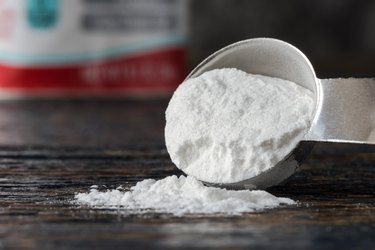
Using baking soda for food does have some benefits, such as neutralizing the acid in coffee. However, adding too much baking soda can become dangerous.
Tip
In small amounts, baking soda is not dangerous. Ingesting it as part of a recipe is OK, but in high amounts, it can cause harmful effects.
Video of the Day
What Is Baking Soda?
According to NC State University News, the difference between baking soda and baking powder comes down to acid. All baking powder includes baking soda. Using one in place of the other in recipes dramatically effects
Video of the Day
Baking soda is a single ingredient: sodium bicarbonate. It is a base that creates a reaction when it comes in contact with an acid. The chemical reaction produces carbon dioxide or CO2. It's often used in baked goods to make the dough or batter rise since the reaction traps the bubbles of CO2 gas.
When the baking soda comes into contact with an acid, the reaction occurs immediately, and when it comes to baking, you want the reaction to happen slowly so the rising doesn't happen all at once. Baking powder is the solution in this situation because its ingredients create CO2 at various stages of the baking process.
Baking Soda for Food
Because baking soda creates a chemical reaction within the food or it's used with, it is a common ingredient in recipes for baking goods. In some recipes, it stands alone, while in others, it needs the other ingredients in baking powder to get the job done.
Baking soda for food can become dangerous for those who are a low-sodium diet. According to the USDA, 1/2 teaspoon of baking soda contains 629 milligrams of sodium. Considering that many recipes for baked goods call for this amount, it's not that bad once you break it down into servings.
However, if the recipe calls for additional salt or you add more salt when you eat it, the salt content can add up quickly. The American Heart Association says a diet that's high in sodium can increase the risk of stroke and heart disease because of sodium's effect on blood pressure.
According to the National Capital Poison Center, too much baking soda can cause multiple problems in the body. The high sodium concentration can lead to seizures, kidney failure and dehydration. The bicarbonate affects the pH of body fluids. When the pH gets too high, the body tries to retain CO2 to restore the proper acidity, making breathing difficult.
Read more: Baking Soda and Lemon Juice Cleansing Drink
Uses for Baking Soda
Baking soda is most commonly used as a leavening agent, but it can also be used in the refrigerator and freezer to absorb odors. When it comes to using baking soda in food, don't use any that has been stored for odor absorption, because it may alter the taste of the food.
In small amounts, you can use baking soda to soothe sore muscles and treat heartburn. However, the National Capital Poison Center warns that you should not use baking soda to treat heartburn or upset stomach without your doctor telling you to do so. Using it as a homemade antacid can cause gas to form rapidly in the stomach, which can lead to stomach rupture after an alcohol binge or large meal.
A September 2018 study published in the Indian Journal of Dental Research says baking soda is a patient-friendly mouthwash, a useful component of toothpaste and useful in chewing gum. It can be used in the long term as an adjunct to other oral hygiene products with virtually no side effects.
- NC State University News: "The Difference Between Baking Soda and Baking Powder"
- USDA FoodData Central: "Leavening Agents, Baking Soda"
- American Heart Association: "Get the Scoop on Sodium and Salt"
- National Capital Poison Center: "My Child Got Into the Baking Soda"
- Indian Journal of Dental Research: "Sodium Bicarbonate: "A Review and Its Uses in Dentistry"